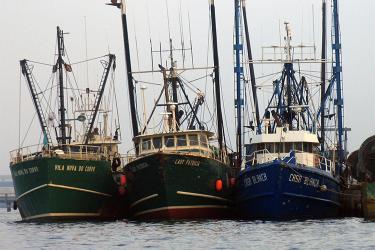Where did you grow up?
I grew up in Northampton, a very small town in eastern Pennsylvania. My entire family is from that area and many of them still live there. I do not like cold weather or snow so I only applied to colleges in warmer climates.
Where did you go to school and in what subject did you get your degree(s)?
I earned a Bachelor’s of Science in Biology with a marine concentration from East Carolina University in 1996. In 2007, I received a Doctorate degree in Coastal Sciences from the University of Southern Mississippi, Gulf Coast Research Laboratory.
How did you come to work at the Southeast Fisheries Science Center?
While studying at East Carolina University, my co-op advisor showed me brochures of the NOAA Ships Oregon II and Chapman. During my last semester, I mailed a letter—there was no email back then—to the center’s facility in Mississippi saying I was interested in volunteering on the research vessels. After graduation, I received a phone call and interviewed for a position working in their reef fish program. Two weeks later, I was in a U-Haul driving to Pascagoula, Mississippi to begin my career and adventures with NOAA Fisheries. It started with a flat tire on a bridge and me hitchhiking to a payphone because there were no cell phones at the time; thankfully things only got better from there.
What do you do at the science center?
Over my 26 year career, I have spent time working on both fisheries and protected species research. For the first 14 years, I conducted fisheries research focusing on the life history of yellowedge grouper but participated in many other research surveys.
In 2011, I began slowly transitioning from fisheries to focusing on protected species research, particularly sea turtles. I became the Sea Turtle Stranding and Salvage Network Coordinator for Mississippi, a role I held for 11 years. My research has focused on sea turtle incidental captures by recreational anglers, sea turtle drift studies to determine how environmental conditions influence seasonal stranding variability, and sea turtle decomposition rates and their implications toward strandings. In late 2021, I transitioned out of the stranding coordinator role for the opportunity to support our sea turtle in-water research. I recently became an aerial survey observer and NOAA Uncrewed Aircraft Systems pilot. One of my current interests is incorporating the use of UAS—or drones—into inshore sea turtle population surveys.
What do you like most about your position?
I chose this career because I love being on the water, have a passion for marine life, and hope to make a difference. Over the last 26 years, I spent a lot of time on NOAA research vessels and saw really cool things like sharks, whales, dolphins, so many different fish, and now I study sea turtles! I also really enjoyed scuba diving, working in Cuban waters, and becoming a drone pilot. I have worked with amazing and talented people over the years and created lifelong friendships. I also really enjoy the outreach work I do, and sharing my knowledge and passion to students, teachers, and anyone that will listen.
What advice do you have for future students interested in STEM?
Take advantage of every opportunity that comes your way, especially if it is outside of your comfort zone! You never know who you will meet or what that opportunity will lead to in the future. I encourage you to volunteer and seek out internships with organizations that interest you. The more experience you have on your resume the better you look to future employers. Finally, don’t seek happiness–create it!
What do you like to do outside of work?
I love spending time with my family, especially my husband, Scott, and amazing daughters, Carly and Kinsey, friends, and pets. We have 2 dogs and 2 cats. I also enjoy cooking, trying new foods and restaurants, and exercising. Paddle boarding in the Gulf of Mexico or bayou is my happy place. I am also very active in my church, Gautier First United Methodist Church, and am going on my second mission trip to Ecuador this summer with both of my daughters.







